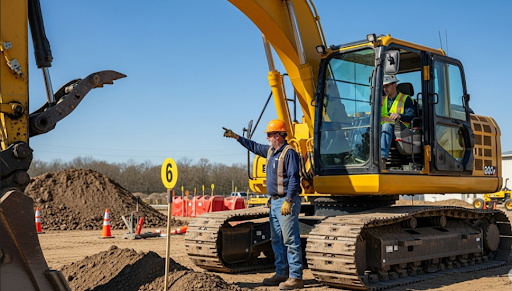Plant and construction operator training includes theoretical and practical instruction on the mechanical operations of heavy machines, such as backhoe loaders and excavators. Here, we are going to explore two important training schemes, NPORS and CPCS, and determine which one you need to improve your career.
Plant and construction operators require certain qualifications and professional training to enhance their professional competency and skills. In this regard, you must have the Construction Plant Competence Scheme (CPCS), NVQ, and a driving license card. However, CPCS and NPORS are two key accreditation schemes for plant operators. While the former one is the most dominant one, the latter is cost-effective and flexible.
What Are NPORS and CPCS?
In the UK, two well-known certification programs for plant operators and construction workers are NPORS (National Plant Operators Registration Scheme) and CPCS (Construction Plant Competence Scheme). Although they have different structures and levels of industry recognition, both seek to guarantee the safe, capable, and professional use of machines on building sites.
The more well-known program, CPCS, was created by CITB and is frequently required for major building projects and government contracts. With an emphasis on standardised testing and adherence to stringent health and safety rules, it offers a carded system to confirm plant operator competency.
A more affordable and adaptable option is provided by NPORS. It encompasses a broader range of sectors than just building, including transportation, agriculture, and warehousing. On-site delivery of NPORS training minimises downtime and prioritises practical skills.
| Key Factors | National Plant Operators Registration Scheme (NPORS) | Construction Plant Competence Scheme (CPCS) |
| Purpose | Established in 1992, it is an alternative accreditation widely popular in the UK. | Established in 2003, It aims to empower experience and skills, as well as safety and health knowledge, of several plant operators. |
| Recognition | Mostly recognised by the UK construction industry due to its cost-effectiveness and spontaneity. | Widely recognised all over the construction industry in the UK. |
| Training | The training takes place on the operational site, driven by flexibility on a significant scale.It shares a CSCS-linked option, similar to CPCS, a Blue and Red card, representing the competent and trained identity. | Although it is a detailed training scheme, it is restricted to some training centres, affecting the training scheme and practices.Operators, in this regard, mostly begin with a red card (trained operator), which is eventually upgraded to blue card (competent operator), |
| Cost | NPORS is comparatively cost-effective due to online training, while the machinery programmes do not require any additional fees for external hiring. Moreover, the cost can be significantly reduced for multiple candidates. | Compared to NPORS, CPCS is expensive due to the testing requirements, while the accredited testing programmes might be inconvenient and charge some additional costs. |
| Accessibility | NPORS is highly flexible, based on locations and tests. These tests can be finished within their own sites, using machinery on a significant scale. | CPCS is very restrictive in nature, and testing and training mostly happen at an official CPSS test centre. |
Table 1: Key Differences between NPORS and CPCS
Which Industries Accept NPORS and CPCS?
CPCS and NPORS are widely used in different industries in the UK, demonstrating competence and operating plant machinery. Here you can find different industries considering CPCS and NPORS.
- 1. Construction
- CPCS is a widely accepted training card on large construction sites, especially for major contractors and excavator training.
- NPORS is a well-established and accepted training programme, effective for smaller projects, while the firms are linked to groups of specific contractors.
- 2. Civil Engineering & Infrastructure
- Both of the training programmes are used and accepted, especially in rail, highways, and utilities projects.
- In major civil engineering and infrastructural projects, CPCS is widely preferred, while NPORS is being recognised in regional infrastructural jobs.
- 3. Agriculture & Forestry
- In forestry and agriculture, NPORS is most common, as it enhances flexibility and a wide range of equipment.
- Due to the strict nature of CPCS, it is the least used scheme in this practice.
- 4. Warehousing, Logistics & Manufacturing
- Among these two schemes, NPORS training is mostly accepted for lifting operations in warehousing and logistics programmes.
- The high expense and lack of flexibility do not allow CPCS as a part of it.
- 5. Demolition
- Both the CPCS and NPORS are accepted, though CPCS is more prevalent in demolition work.
- NPORS is sometimes preferred for its wide scope of different categories.
Which Between NPORS and CPCS Will You Need?
Take a look at the two points given below to know:
When Do You Need CPCS?
You need the CPCS scheme, certifying individuals to provide various types of plants, including telehandlers and excavators. Moreover, the CPCS card can be a benchmark of professional competence and high-skilled knowledge of safety and health standards, valued by employers. Overall, CPCS is mostly required for large construction sites. It is valuable for excavator training and operators, since it ensures standardised certification. Having a CPCS card is a key requirement at construction sites, portraying a better understanding of machinery and enhancing employment opportunities.
When Do You Need NPORS?
Once you need the operator competence, you must have the NPORS card, as employers and several contractors on sites, especially within construction, value it. Moreover, it is effective in several industries, including agriculture, marine and demolition. NPORS is valuable and useful if cost is a factor, while the cross-industry recognition and flexibility of NPORS can be advantageous over CPCS.
Summary
NPORS and CPCS are two training schemes popularly used in the UK. NPORS is cost-effective and flexible in multiple industries, while the use of CPCS includes high compliance and is widely recognised in large-scale construction. Among these two, choosing the right one depends on employer requirements and career path.
But whichever you choose, training is of optimal importance for the right implementation. And for that, you ought to reach out to a reliable training agency.



